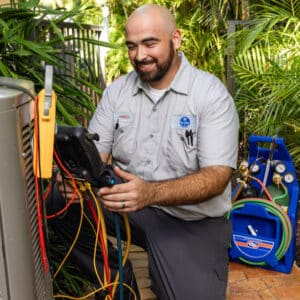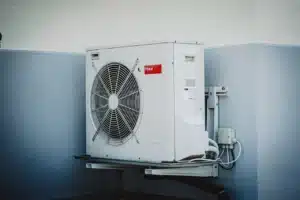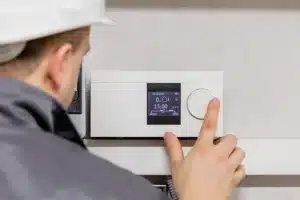Keeping Your AC System Running Smoothly Throughout the Year
Florida homeowners rely on air conditioning more than most parts...
Florida is known for its warm, humid climate, but even in this state, periods of dry air occur, particularly during the winter months. These dry spells can affect both comfort and health, causing dry skin, irritated sinuses, and respiratory issues. For homeowners looking to maintain a comfortable indoor environment, humidifiers can play a critical role in alleviating these problems. Understanding how humidifiers work, the benefits they offer, and the best practices for using them can help Florida residents stay comfortable and healthy during the dry season.
A humidifier is a device designed to add moisture to the air. Maintaining proper indoor humidity levels—typically between 40% and 50%—is important for overall health and comfort. When air becomes too dry, it can exacerbate allergies, dry out nasal passages, irritate skin, and even damage wooden furniture and flooring.
Humidifiers come in various types, including:
Choosing the right type depends on the size of your home, your specific needs, and your HVAC setup.
Dry air can contribute to a range of health problems. Humidifiers help mitigate these issues by restoring moisture to the air. Key benefits include:
For families with children, elderly individuals, or those with respiratory conditions, maintaining optimal humidity can be particularly important.
Beyond personal health, maintaining adequate indoor humidity helps protect the structure of your home. Low humidity can cause wood floors to crack, furniture to warp, and paint to chip. Electronics may also be affected by static electricity in dry environments. By adding moisture to the air, humidifiers help preserve your home’s materials and reduce wear and tear.
Integrating a humidifier with your HVAC system can provide consistent and efficient humidity control throughout your home. Whole-house humidifiers work in conjunction with your heating and cooling system to maintain balanced moisture levels. Benefits of integration include:
Proper installation and maintenance are essential to ensure the system functions effectively and prevents issues such as mold growth or excessive humidity.
While humidifiers provide numerous benefits, incorrect use can create problems, including mold growth, dust mite proliferation, and respiratory irritation. To maximize benefits and minimize risks:
Following these best practices ensures that your humidifier contributes to a healthier and more comfortable home environment.
Certain signs indicate that your indoor air may be too dry and a humidifier could help:
Observing these symptoms early allows homeowners to address the issue before it affects health or the home’s interior.
For homeowners considering whole-house humidifiers, consulting an HVAC professional in Florida is recommended. Professionals can assess your home, recommend the best unit for your needs, install it safely, and provide ongoing maintenance. Regular inspections help ensure that the humidifier and HVAC system work together efficiently, reducing energy costs and maintaining indoor air quality.
Dry air can create discomfort and health challenges in Florida homes during the dry season. Humidifiers provide an effective solution by adding moisture to the air, supporting respiratory health, protecting skin, and preserving your home. Whether using a portable unit or a whole-house system integrated with your HVAC setup, proper maintenance and monitoring are key to safe and effective operation.
By understanding the role of humidifiers and taking steps to maintain balanced indoor humidity, homeowners in Florida can improve comfort, reduce allergy and respiratory symptoms, and protect both their health and their property throughout the dry season.

Florida homeowners rely on air conditioning more than most parts...

Indoor air quality is a major concern for many Florida...

Indoor air quality, often abbreviated as IAQ, plays a crucial...

Installing a new HVAC system is a significant investment in...

For many homeowners in Florida, the HVAC system is the...

Homeowners in Florida are always looking for ways to stay...